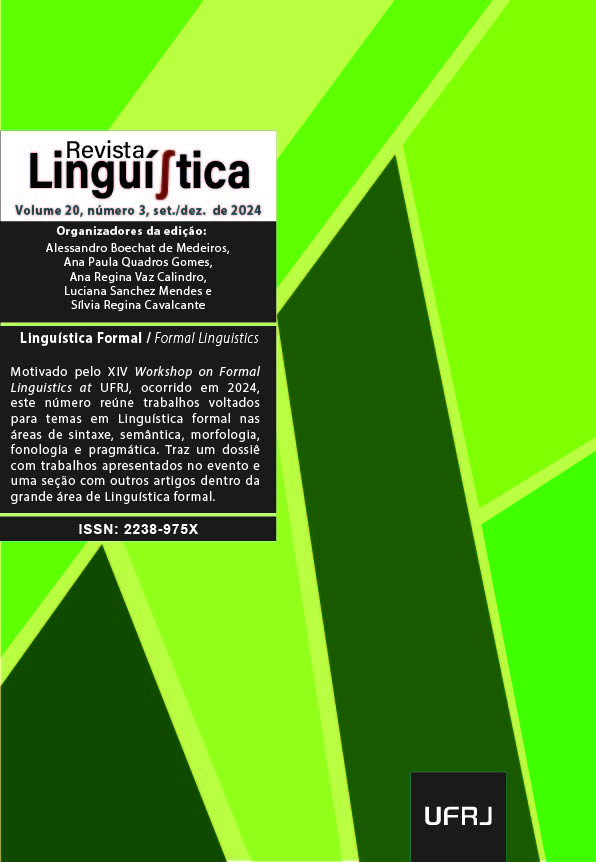A construção modal ‘vai que’ no português brasileiro
DOI:
https://doi.org/10.31513/linguistica.2024.v20n3a65263Abstract
This paper discusses the modal construction ‘vai que’ from Brazilian Portuguese. Our goal is to analyze its syntactic, semantic and pragmatic aspects. This construction is used when the speaker wants to convey that something is possible, thus, it is a modal construction. Our analysis follows proposals from cartographic syntax (Cinque, 1999; Tsai, 2015; Rizzi; Bocci, 2017), formal semantics (Kratzer, 1991; von Fintel, 2006; Hacquard, 2006, 2010, 2011) and formal pragmatics (Stalnaker, 1999; Portner, 2004). Previous analyses of ‘vai que’ have argued that it is: (i) weak; (ii) epistemic; (iii) conditional like; (iv) counterfactual; (v) high in the hierarchy; and (vi) a directive speech act (see Andrade, 2012, 2014, 2019; Dearmas, 2022, 2024; Ely and Cezário, 2023a, 2023b). We agree that it is a weak epistemic modal based on paraphrasis and contradiction tests (von Fintel; Heim, 2011), but we argue that ‘vai que’ is not part of a conditional structure, it does not convey counterfactuality, it is not higher than the epistemic modal head in the functional hierarchy, and it is also not a directive speech act. In our analysis, ‘vai que’ accesses the speaker’s beliefs through the speech event, following Hacquard (2006, 2010), and it presupposes another proposition in the common ground working as a justification for it.
Keywords: ‘Vai que’. Modality. Speech act. Formal semantics. Cartographic syntax.
Downloads
Published
Issue
Section
License
Copyright (c) 2025 Revista Linguí∫tica

This work is licensed under a Creative Commons Attribution-NonCommercial 4.0 International License.
Authors who publish in the Revista Linguí∫tica agree with the following terms:
The authors maintain their rights, ceding to the journal the right to first publication of the article, simultaneously submitted to a Creative Commons license permitting the sharing with third-parties of published content as long as it mentions the author and its first publication in the Revista Linguí∫tica.
Authors may enter into additional agreements for the non-exclusive distribution of their published work (for example, posting in online institutional or non-profit repositories, or book chapters) so long as they acknowledge its initial publication in the Revista Linguí∫tica.

The journal Revista Linguí∫tica is published by the Post-Graduate program in Linguistics of UFRJ and employs a Creative Commons - Attribution-NonCommercial 4.0 International (CC-BY-NC).









